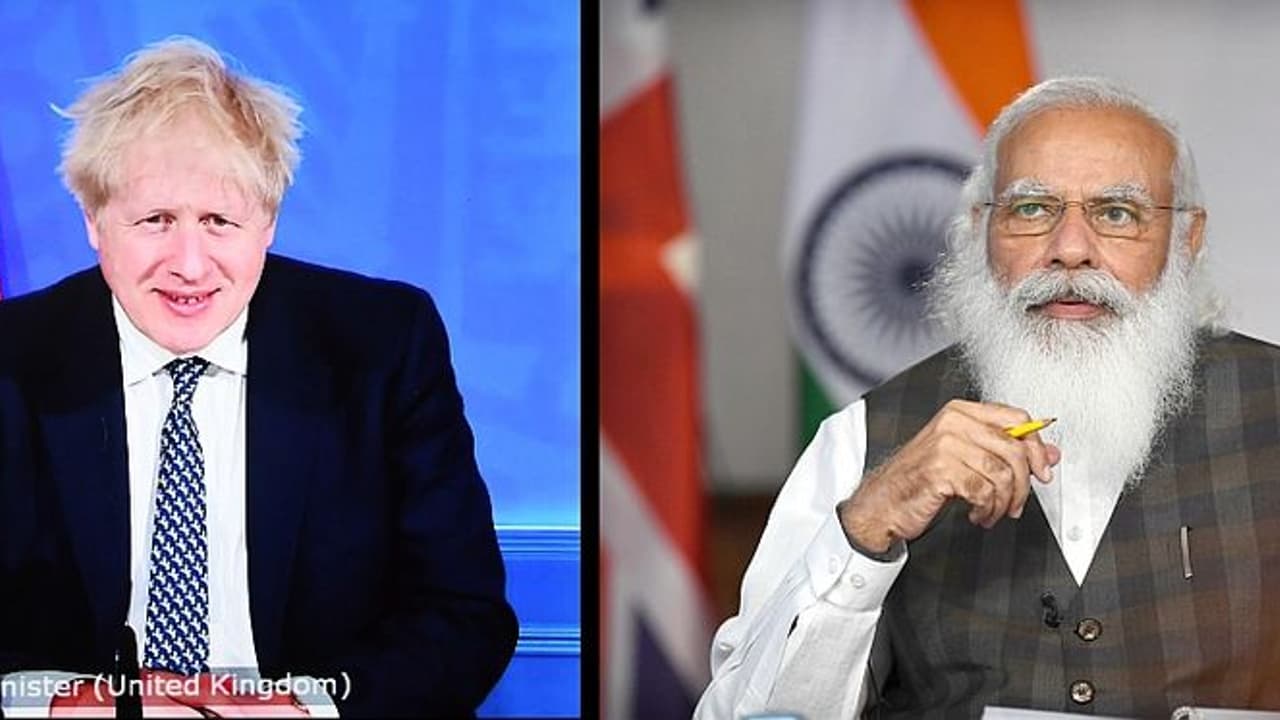Prime Minister Narendra Modi and his British counterpart Boris Johnson announced their intent to negotiate a comprehensive and balanced FTA, including consideration of an Interim Trade Agreement for delivering early gains.
Prime Minister Narendra Modi and his British counterpart Boris Johnson on Tuesday launched the ambitious comprehensive Roadmap 2030 to elevate the India-UK partnership to a Comprehensive Strategic Partnership and also agreed to double the bilateral trade by end of this decade.

The two prime ministers held a virtual summit on Tuesday after Johnson cancelled his visit twice in January and April due to a surge in Coronavirus cases in both countries.
The roadmap will pave the way for a deeper and stronger engagement over the next ten years between both nations.
"The roadmap is quite comprehensive and lists a number of concrete, forward-looking and outcome-oriented activities or initiatives that both sides have agreed to pursue in five keys areas, namely, people to people contacts, trade and economy, defence and security, climate action and health," Joint Secretary (Europe West) in the ministry of external affairs Sandeep Chakravorty said.
During the Summit, the two prime ministers declared the Enhanced Trade Partnership.
In a series of tweet, Prime Minister Narendra Modi said, "Had a productive Virtual Summit with my friend UK PM @BorisJohnson. We adopted an ambitious Roadmap 2030 for elevating India-UK ties to a comprehensive strategic partnership."
"The two-way trade between India-UK in 2019-20 was $15.4 billion Dollars. Though steadily rising in recent years, the figures do not reflect the true potential for trade between the world's 5th and 6th largest economies. Moreover, Brexit has provided tremendous new opportunities for both countries," Chakravorty said.
"We welcomed the launch of an Enhanced Trade Partnership as a roadmap to a comprehensive FTA, with a target to more than double the bilateral trade by 2030. We also agreed upon several new initiatives in health, technology, energy, etc," the prime minister said.
"To seize them and unlock the true potential, the two leaders announced their intent to negotiate a comprehensive and balanced FTA, including consideration of an Interim Trade Agreement for delivering early gains. The ambition is to more than double the bilateral trade by 2030," Chakravorty said.
As part of the confidence-building measures, they have also agreed on an early market access package.
Under this, the UK will open up the fisheries sector for more Indian players, facilitate more opportunities for nurses, recognise Indian seafarers certificates and also enter into a joint dialogue on the Social Security Agreement.
"These actions are likely to generate 20-25,00o new direct and indirect jobs in India," he added.
The two leaders also discussed the Covid-19 pandemic. PM Modi thanked his counterpart for the prompt medical assistance provided by the UK in the wake of the severe second wave in India.
"The UK was one of the first to respond, sending critical medical equipment including oxygen concentrators, cylinders, ventilators and oxygen plants," the joint secretary said.
On vaccine development, they agreed to expand partnership on vaccines, therapeutics and diagnostics on Covid-19 and beyond through joint research including on nasal vaccines, regulatory and clinical trial cooperation.
The UK is India's second-largest partner in research and innovation collaborations. Both sides agreed to enhance regulatory and technical cooperation on new and emerging technologies including Digital and ICT products and work on supply chain resilience.
PM Modi proposed Joint CoE on Green Hydrogen which was accepted.
The two countries also signed a pact on the new India-UK Global Innovation Partnership, aiming to support the transfer of inclusive Indian innovations to select developing countries.
Both India and UK will be co-financing it and also create a new market-driven fund that mobilises additional resources to support Indian innovations and their transfer to third countries.
On defence and security, the two countries also agreed to substantially strengthen the engagement including in the maritime, counter-terrorism and cyberspace domains.
"UK has recently come up with its Integrated review on Security, Defence and Foreign Policy which identifies India as a key partner. As part of the British tilt to Indo-Pacific, UK has announced the deployment of Carrier Strike Group (CSG) in the Indo-Pacific Region," he added.
India has agreed to conduct joint exercises with the CSG later this year and also launch a new maritime dialogue. "Opportunities for defence co-development and co-production were also discussed," Chakravorty said.
The UK will be hosting the COP26 this year in Glasgow and is keen to achieve global consensus for an ambitious outcome.
India and the UK agreed to closely engage at CoP26 and reiterated their commitment to ambitious climate action to achieve the goals of the Paris Agreement.
The UK will also be hosting G7 this year and has invited India as a guest country.
In a major development, the two countries signed a comprehensive MoU on Migration and Mobility Partnership. Under the MoU, the UK has agreed to create a new scheme for youth mobility.
Every year, up to 3000 young Indian professionals can avail employment opportunities in the UK for a period of two years without being subject to labour market test.
The UK has such arrangements with select partner countries like Australia, Canada, Japan, South Korea.
